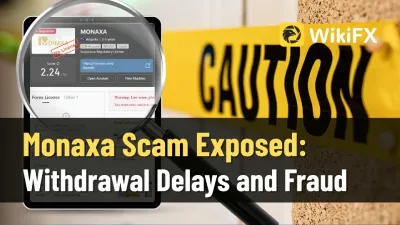WikiFX report: Luno Announces That Its Nigerian Users Will Soon Be Able To Withdraw and Deposit Fund
Abstract:Nigerian merchants will be able to withdraw and deposit funds on cryptocurrency trading platform Luno after more than seven months. Following the country's cryptocurrency ban in February, the platform halted naira transactions.

After more than seven months, Nigerian traders will now be able to withdraw and deposit funds on cryptocurrency trading platform Luno. The platform had paused its naira transactions in February following the ban on cryptocurrency in the country.
So, why did Luno suspend its operations in the first place?
The Central Bank of Nigeria (CBN) had issued a circular to all non-bank financial institutions (NBFIs), deposit money banks (DMBs), and other financial institutions (OFIs) advising them to close bank accounts held by cryptocurrency service providers.
According to the CBN, virtual currencies such as Bitcoin and Litecoin were being used to fund terrorism and money laundering because of their anonymity. Because of this, the government considers crypto trading as a threat to its anti-corruption drive and national security.
Luno was among the players affected by this directive, which forced them to pause all naira deposits and seek clarification. The bank also blocked access to the accounts; therefore, Luno customers couldnt access or withdraw their funds.

Apart from Luno, other Nigerian fintech companies such as Piggyvest, Chaka, Monnify, Risevest, and Agropartnership deactivated their accounts, causing panic among Nigerian traders.
What is Luno doing to get back?
Although the ban on cryptocurrency trading is still active, Luno says its consulting with the authorities on how to navigate the new regulation.
The trading platform announced that its customers would get more information soon about the launch date and when they could start withdrawing their funds.
By the time of accounts closure, Luna had assured its customers that their money was safe and would be available as soon as the company got the green light from the CBN.
What is the current state of cryptocurrency trade in Nigeria?
Since the ban, there has been an increase in peer-to-peer transfers. These trades have become prevalent on platforms such as Paxful. However, Luno didnt focus on having this feature available for its customers.
The government is also planning to launch its own digital currency, eNaira, on October 1st. They have already partnered with Barbados-based Fintech company Bitt Inc. for the virtual currency project. This might be an attempt to replace all other cryptos in the country.
However, not everyone in the government supports this ban by CBN. Nigerian vice president Yemi Osinbajo called for regulation instead of a complete ban.
With players such as Luno trying to make a comeback, it will be interesting to see their discussions with the regulatory authority. Additionally, how this can be replicated for other cryptocurrency trading platforms in Nigeria.
Read more

FXORO Review: Investigating Withdrawal Denial and Fund Scam Allegations
FXORO, a Seychelles-based forex broker, has been receiving quite a few negative reviews from traders. Looking at the overall complaints, traders are not happy with the way the broker handles withdrawal issues. Even more concerning is the loss due to its alleged advice of not using risk management tools. Some traders even alleged to have been taken advantage of by the broker’s officials. In this FXORO review article, we have collected a list of complaints against the broker. Keep reading to know about them.

EPFX Exposure: Examining Complaints Concerning Withdrawal Denials & Account Blocks
Lured into trading on the EPFX platform with an attractive bonus that did not come to your account? Was your profile disabled by the broker upon raising a technical query concerning a profit withdrawal request? Did the South Africa-based forex broker deny you access to withdraw your hard-earned capital from the platform? Have you faced account closure by the EPFX broker without any reason? These alleged scams have become the centre of discussion on broker review platforms. We have shared these complaints in this EPFX review article. Keep reading!

Arena Capitals Complete Review: Finding High Risks and Major Warning Signs
Is Arena Capitals a safe and trustworthy broker? The evidence gives us a clear answer: no. Our research into Arena Capitals shows a high-risk business that doesn't have the basic protections needed to keep investor capital safe. The main reason for this conclusion is that no respected financial authority regulates them at all. This main problem gets worse when you add extremely low trust scores on checking websites, official warnings telling traders to stay away, and a troubling pattern of user complaints, especially about not being able to withdraw funds. Based on our study of public information, we strongly recommend against opening an account or investing in Arena Capitals. This Arena Capitals review will explain the evidence behind this warning, helping you make a smart and safe choice.

Monaxa Scam Exposed: Withdrawal Delays and Fraud
Monaxa scam exposed: denied payouts, downtime, profit manipulation, weak offshore license. Protect your money—read full broker review now!
WikiFX Broker
Latest News
ProMarkets Review: Total Forex Scam Alert
Clone Broker Alert: Darwinex, AIM & Spreadex Targeted
1,789 Victims, Nearly $300 Million Lost: Gold High-Return Scam Exposed
Admiral Markets Review: Regulation, Licences and WikiScore Analysis
UPFOREX Regulatory Status: A 2026 Deep Dive into Its Licenses and Risks
UPFOREX Review 2026: Is UPFOREX Safe or Scam? A Look at User Reviews and Warning Signs
The micro-documentary "Let Trust Be Seen" is officially launched today!
HKEX Profit Surge Signals Massive Chinese Capital Inflow and Asian Market Resilience
Jane Street Under Fire: From India’s Market Ban to a $40 Billion Crypto Conspiracy
TradingMoon Review: Offshore Regulated Fraud Risk Exposed
Rate Calc

